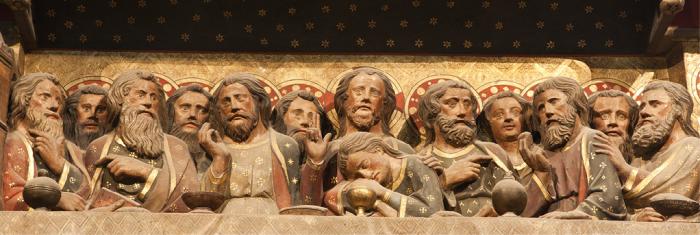
2.15 Chi sono gli Apostoli? Chi sono i loro successori?
Durante la sua vita terrena, Gesù scelse dodici discepoli, o Apostoli, che inviò nel mondo per aiutare le persone e proclamare loro il suo messaggio, il Vangelo. In effetti la parola apostolo significa colui che è inviato.
Dopo la morte e risurrezione di Gesù, gli Apostoli continuarono la loro opera. Essi passarono il ministero che avevano ricevuto da Gesù ai loro successori, che chiamiamo vescovi. I vescovi di oggi sono i successori degli Apostoli, attraverso una lunga serie di predecessori.
In the Kingdom, what authority did Jesus bestow upon his Apostles?
Jesus chose the twelve, the future witnesses of his Resurrection, and made them sharers of his mission and of his authority to teach, to absolve from sins, and to build up and govern the Church. In this college, Peter received “the keys of the Kingdom” (Matthew 16:19) and assumed the first place with the mission to keep the faith in its integrity and to strengthen his brothers. [CCCC 109]
In what does the mission of the Apostles consist?
The Word “Apostle” means “one who is sent”. Jesus, the One sent by the Father, called to himself twelve of his disciples and appointed them as his Apostles, making them the chosen witnesses of his Resurrection and the foundation of his Church. He gave them the command to continue his own mission saying, “As the Father has sent me, so I also send you” (John 20:21); and he promised to remain with them until the end of the world. [CCCC 175]
Why did Jesus call apostles?
Jesus had a large circle of disciples around him, both men and women. From this circle he selected twelve men whom he called apostles (Lk 6:12–16). The apostles were specially trained by him and entrusted with various commissions: “He sent them out to preach the kingdom of God and to heal” (Lk 9:2). Jesus took only these twelve apostles with him to the Last Supper, where he gave them the command, “do this in remembrance of me” (Lk 22:19b).
The apostles became witnesses of Jesus’ resurrection and guarantors of the truth about him. They continued Jesus’ mission after his death. They chose successors for their ministry: the bishops. To this day, the successors of the apostles exercise the authority conferred by Jesus: They govern and teach and celebrate the liturgy. The cohesiveness of the apostles became the foundation for the unity of the Church (apostolic succession). Preeminent once again among the Twelve was Peter, on whom Jesus bestowed special authority: “You are Peter, and on this rock I will build my Church” (Mt 16:18). From Peter’s special role among the apostles developed the papal ministry. [Youcat 92]
Why is the Church called apostolic?
The Church is called apostolic because she was founded upon the apostles, holds fast to their Tradition, and is governed by their successors.
Jesus called the apostles to be his closest collaborators. They were his eyewitnesses. After his resurrection, he appeared to them repeatedly. He bestowed on them the Holy Spirit and sent them as his authoritative messengers to all the world. They assured unity in the early Church. They conferred their mission and authority upon their successors, the bishops, through the laying on of hands. This process is called apostolic succession. [Youcat 137]
What is apostolic succession?
Apostolic succession is the transmission by means of the sacrament of Holy Orders of the mission and power of the Apostles to their successors, the bishops. Thanks to this transmission the Church remains in communion of faith and life with her origin, while through the centuries she carries on her apostolate for the spread of the Kingdom of Christ on earth. [CCCC 176]
What is the work of Christ in the liturgy?
In the liturgy of the Church, it is his own paschal mystery that Christ signifies and makes present. By giving the Holy Spirit to his apostles he entrusted to them and their successors the power to make present the work of salvation through the Eucharistic sacrifice and the sacraments, in which he himself acts to communicate his grace to the faithful of all times and places throughout the world. [CCCC 222]
The succession of priests keeps me [in the Catholic Church], beginning from the very seat of the Apostle Peter, to whom the Lord, after his resurrection, gave it in charge to feed his sheep, down to the present episcopate. [St. Augustine, Against the Epistle of Manichaus called Fundamental, Chap. 4 (ML 42, 175)]





